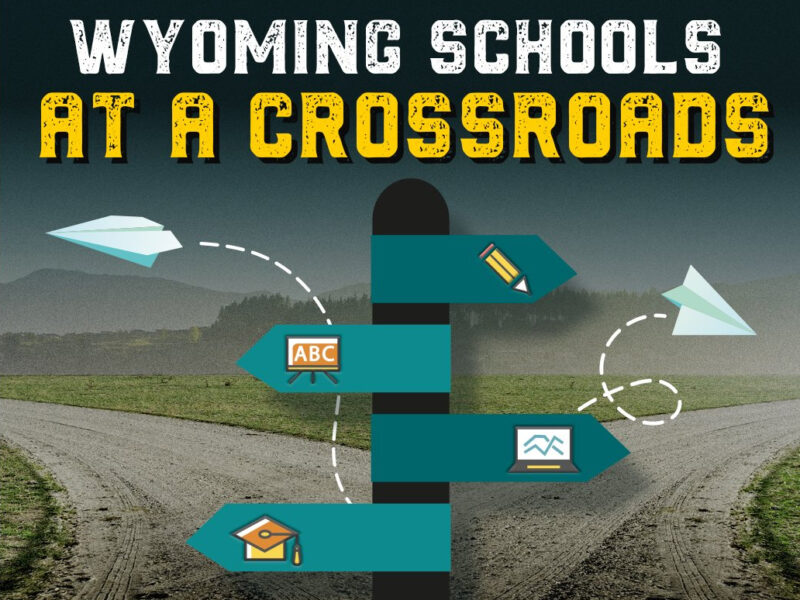WYOMING SCHOOLS AT A CROSSROADS: Teaching English in the Age of Emojis
Gillette English teachers navigate technology challenges to teach grammar fundamentals
- Published In: Other News & Features
- Last Updated: Oct 13, 2022

By Jennifer Kocher
Special to the Wyoming Truth
GILLETTE, Wyo. – Two months into the school year, students at Twin Spruce Junior High School in Gillette know the drill. Before the bell rings, their cell phones go in the numbered pouches hanging on the wall near eighth-grade English teacher Bridget Graham’s desk. Like other schools in the Campbell County District, Twin Spruce teachers choose whether students can have phones in class. Graham has opted for a no cell phone policy, meaning students turn in their devices before class, but can use them in between and at lunchtime.
Even without devices in hand, there’s a residual impact of the teens’ near-constant access to technology that Graham and her colleagues find challenging. In the age of emojis, it’s an uphill battle to effectively teach grammar and writing skills.

And it’s one that gets worse every year, Graham admitted, as students increasingly rely on texts, instant messages and videos to communicate with peers. This form of communication, referred to as “textese,” is a language of its own, rife with cyberslang and largely devoid of punctuation.
It’s not that the students can’t recognize proper grammar, which they prove on a daily basis as they dissect the missing punctuation and other problems in the sentences Graham posts on her white board. But when she assigns students to write their own paragraphs, they’re often at a loss for how to punctuate them and don’t see the point.
“They think periods, capitalization and spelling are not relevant,” she said.
When Graham explains that these skills will have great benefit on their future – such as filling out job or college applications – they call her old-fashioned and say they’ll worry about grammar when the time comes.
“They just don’t see the benefit and real-life application,” she said.

Language Competency
The research is wildly divided when it comes to determining whether or not “textese” and other forms of abbreviated social media communication are actually hurting young people’s ability to master grammar and literacy.
One study published in the British Journal of Developmental Psychology in 2017 argued that criticism of “textese” as a “lazy” language is largely overstated. Instead, the authors suggest that using “textese” does not mean that people are ignorant of grammar rules and that texting is a form of creativity that improves language skills.
Another study asserted that “textese” has a positive impact on spelling and literacy. Similarly, in their article “Relationships Between Grammar and Texting,” the study’s authors claimed that children “who used more ungrammatical word forms and more unconventional orthographic [or 3-D] forms showed better…spelling and growth in orthographic processing.”
Not all researchers are on board with this glowing analysis. In fact, Wayne State University Education Professor Khalil El-Saghir argued just the opposite. In his 2015 study, “The Impact of Texting Use and Practices on Literacy Development,” El-Saghir refuted linguist claims about the positive effects of texting on the language skills of young people, citing undisputed statistics about the decline in literacy skills in the U.S.
According to the National Center for Education Statistics, only 34% of eighth graders in the U.S. tested at or above National Assessment of Educational Progress (NAEP) proficiency, which declined from 36% two years prior.
In the 2022 “Report on the Condition of Education” by the Institute of Education Sciences, the average reading score for 13-year-old students fell three points between 2012 and 2020, down from 263 to 260 according to NEAP data.
New generation reads less, texts more
Fellow Twin Spruce English and reading teachers Jamie Matson and Kacee Von Krosigk agree with the latter research as grammar becomes less emphasized in the school curriculum.

Matson, who has been teaching for 12 years and currently serves as department head, said educators increasingly focus on content rather than syntax. The reason: standardized state tests and curriculum emphasize comprehension and textual analysis because punctuation and spelling only account for about 5% of the exam. And though students are required to practice grammar and writing skills on sites like “noredink,” English teachers no longer teach from grammar books like she did when she was in school.
Another trend that’s contributing to the students’ stunted writing skills: they’re not reading for pleasure like previous generations. If a student completes an in-class assignment early, he or she is much more prone to ask to use their phone than grab a book off the shelf, Matson said. In her estimation, students seem more drawn to videos and other forms of instant communication than getting lost in a good book.
The reduced attention span also works against them when it comes to research or other assignments requiring them to access information on the internet, Von Krosigk noted.
“They do a specifically worded key search and then throw up their hands if nothing comes back, instead of clicking on links and reading an article,” she said. “It’s as if they’re not curious enough to look into the topic.”
To that point, Graham added, she’s noticed that students need encouragement to get past the first sentence in an essay. Instead of just writing, some students ask her to check on their work to see if they’re doing it correctly.

“They aren’t doing independent steps on their own,” she said. “They need reassurance.”
Uphill battle
Regardless of whether or not texting and social media are actually having a detrimental impact on students’ literacy skills, smart phones and increased access to technology have changed the way young people communicate, forcing teachers to adapt their own skills.
Matson, Graham and Von Krosigk—all in their 30s and not much older than the students they teach—have seen a huge transition how children communicate in their lifetime.
Graham said students now converse with peers through videos and texts, even when sitting next to them. They might just take a picture of a wall and send it to their friends with some kind of comment, which seems to entertain them. Between classes, female students often record themselves dancing for TikTok videos.
As young people increasingly live their lives on screen, teachers must get creative to figure out new ways to reach them.
“It’s an uphill battle,” Graham reiterated, “and seems to get harder every year.”













